The 2013 Buffalo Small Press Book Fair Recap
On Friday, April 5th I found myself in the wrong rust belt city, surrounded by the wrong group of rust belt poets. I was in Cleveland when I was supposed to be getting ready to write an "Open Door" feature on the 2013 Buffalo Small Press Book Fair. Like John Carter of Mars, I found myself transported to the wrong place and wrong time for the civic boosterism that I'd been assigned. My job was a piece on Buffalo, which local tweeters call #buffalove, and there I was that Friday gallivanting at the Cleveland Poetics Group, which might be #clevelanolove, though I guess that hashtag is a little wanting. My tale of two cities meant racing back Friday evening and sadly missing the festivities of the opening night. Thankfully though I arrived fresh and energized for the start of the fair proper on Saturday, and I have much terrific things to say about it.
Chris Fritton, who directs the fair, took the opportunity to meet with me a couple weeks earlier to provide snapshots of the event both past and present. The Buffalo Small Press Book Fair (BSPBF) marked its seventh year this April. Fritton and Kevin Thurston co-founded the event in 2007, and they operated like an extremely effective Kermit-and-Fozzy team for the next two years. In the third year Thurston vamoosed to Baltimore and Seoul, and it's been a one man show ever since.
Fritton is a printmaker, poet, and community animator. He pays the bills through his job as full-time Studio Director at the Western New York Book Arts Center (WNYBAC, pronounced win-eee-back). He runs the letterpress and screen-printing studio and teaches the tricks of the trade to a regular stream of students. He also designs and produces posters for events throughout the area, like the famed Big Night series sponsored by Just Buffalo Literary Center.
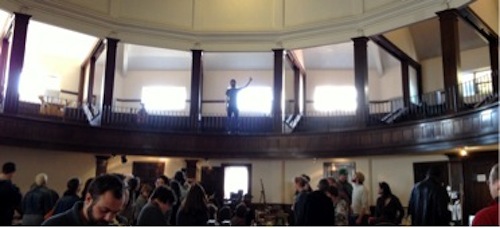
Fritton has deep roots in the Buffalo poetry community. As an undergraduate philosophy major at the University at Buffalo, he branched out and took courses taught by Poetics Program faculty, including Charles Bernstein, Susan Howe, and Robert Creeley. Fritton says Bernstein brought to classes "mind-numbing amounts of info. You would never be able to read all, but the important part was to hook on something." He moved away from Buffalo for graduate study at the University of Maine, home of the National Poetry Foundation, where he studied with Carla Bilitteri, Jennifer Moxley, Steve Evans, and Benjamin Friedlander. He may have embraced academia at that moment, but he remembered Bernstein encouraging him to keep making books--and "to be 100% entrepreneurial about it." Zoom ahead to 2013, and Fritton is the young Obi-Wan Kenobi of Buffalo printmakers and the master of ceremonies for the BSPBF.
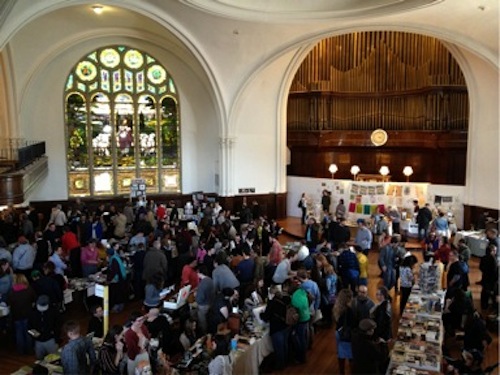
The setting for the fair is a towering century-old cathedral on Porter Ave that houses the Karpeles Manuscript Library Museum. Visitors parade through gargoyle-grey arches to enter a brightly lit nave where vendors line the tables and display their wares. While the church pews are long gone, the cracked stain-glassed windows, the quire, the balconies, and the wall of organ pipes remain. The setting is perhaps too quixotic for convention planners that expect the latest tech and climate control, but it's heaven for old school printmakers and fellow travelers.
Many out-of-town visitors told me they were struck by differences between the fair and the AWP conference that took place about a month prior, many of whom attended both events. I spoke to poet Jessica Smith about the book fair: "BSPBF's cheap [$30] tables and simultaneous readings, workshops, and food allow new and mico presses to table and present their poets through readings and teach people about the art of bookmaking (all without breaking the bank or starving). BSPBF is about Making: it empowers artists, writers and the community at large to engage." Bravo to that!
When it came to the selection process, Fritton said the BSPBF is fortunate because it is not beholden to anyone "whether in content or anticipated mode of delivery." Material can come from a 17 year old making stapled zines and comic books, and not necessarily from the imprimatur of university presses. The curating strives to be absolutely inclusive: "Let's give five minutes to the guy who self-published his ridiculous sci-fi novel." Attendees get more than paper merchandise too—they get a teeming caravanserai of artistically constructed printmaking and letterpress. Trinkets from a repurposed book? They make the cut. Fritton's seating chart is purposively disjunctive, mingling poetry presses, with comics, printers, and other media. Fritton seeks to facilitate connections between writers and the printmakers who might create their next book cover. Fritton sums up the selection criteria: "If you made a chicken-wing cookbook, you're not getting in. But any other small press, DIY, screen printing, etcetera--that will get careful consideration."
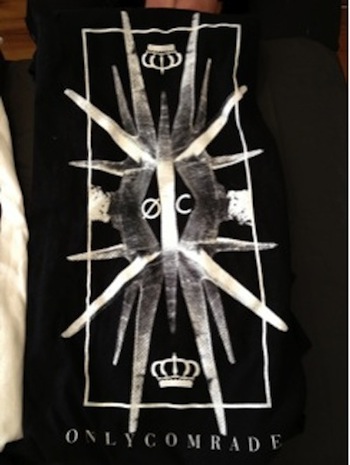
So voila the BSPBF is in its seventh year of operation, and its size keeps growing. This year the fair is spread over two days. I asked Fritton why, and he pointed to the number of interested vendors and the need to accommodate people who work Saturdays. Fritton reports that in the first year there were only 65 vendors and 8-900 people through the door. Last year there were 110 vendors and 3,000 people in attendance. This year 200 applications arrived on Fritton's desk within the first five days, and from these he selected 140 vendors for the fair. He also made calls to ensure the food trucks were parked out front, and they acted on town locals like the Pied Piper of Hamelin.
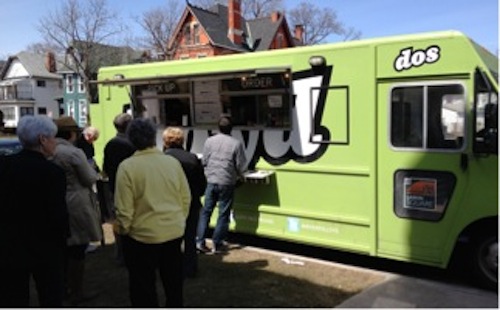
A major presence of the festivities was Ted Pelton, founder of Starcherone Press. I first met Pelton shortly after moving to Buffalo, but only now did I get a chance to talk about his decades of involvement with local small press happenings. Pelton started independently by doing staple-bound editions of the books that interested him. He also had a collection of his own stories that he found difficulty placing with publishers weary of experimental fiction, so he decided to publish the book on his own. Soon thereafter Raymond Federman, who liked Pelton's collection, offered him The Voice in the Closet. Federman's book had been translated, it had the attention of scholars, but it had gone out of print until Starcherone reissued the new edition in 2001.
Today the current rate of publication for Starcherone is 3 or 4 books per year, though the number has risen as high as 6 in past years. Pelton quotes Pound's advice to a young Robert Creeley that editorial undertakings must demonstrate "a constant and a variance." Pelton described his own mission by noting that "mainstream fiction is at the most conservative form there is." For Starcherone, the books are 100% experimental fiction or cross-genre work. The press holds an annual contest with blind submissions, and each winner for the last nine years has turned out to be a debut novel. The press inventory ranges from Leslie Scalapino's Floats Horse Floats to Kent Johnson's A Question Mark Above the Sun. Starcherone's trade edition supplements Johnson's original (published by Punch Press) with reviews (positive and negative), blog commentary, and an essay by an intellectual property law professor.
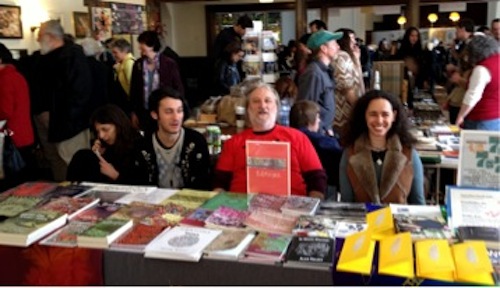
Poet publisher mIEKAL aND occupied tables on both days. He flew in from his organic farm in Wisconsin hauling a cargo from Xexoxial Editions (above) that arguably represented the formally edgiest and most varied exhibition of the entire fair. There were editions by Bruce Andrews, Bern Porter, and Alan Hasley. There were editions by Maria Damon, Bob Cobbing, and Hannah Weiner. There was the cover of a derek beaulieu visual poem "Kern" that the designer shrunk down from a massive original image that spanned 14 feet.
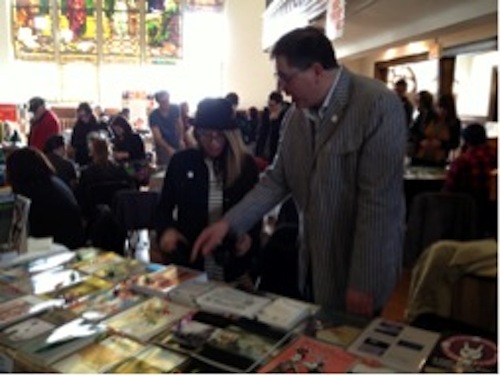
Buffalo's own poet, publisher, and gourmet chef Geoffrey Gatza could be seen at tables and events throughout the fair. Not only did he work long hours at his BlazeVOX display on both days, but on Friday night he prepared one of the five-star buffets for which he is legendary at local readings. Using a shoestring budget, Gatza scouts deals, buys local, and feeds the stomachs of the audience members. He's a gem in Buffalo for sure.
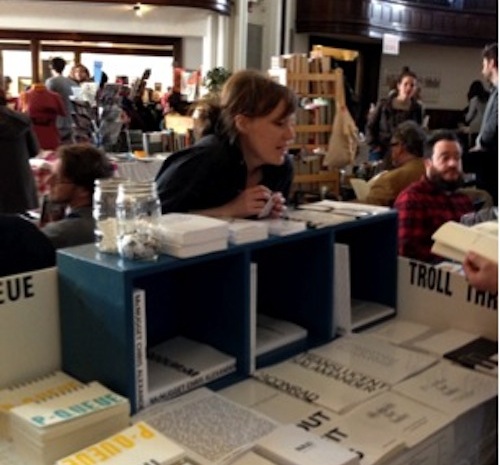
On Saturday morning I fought my way through the crowd to reach the table for Troll Thread. This merry band from the Buffalo Poetics Program might most easily described as a next generation conceptualism, though at the same time the execution of their work reflects qualities—perhaps emo?—that hint at a break from such tenets. Harriet readers will be familiar with them because several members recently participated in the guerrilla readings at the MOMA, and have been featured here. Troll Thread editions can be ordered from Lulu, but the editors confess that not even they can afford to buy the full run of their inventory given the present economic blight.
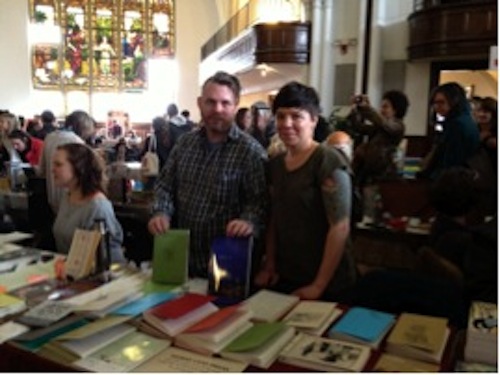
Horse Less Press is the imprint of the editorial team Jennifer Denrow, Erika Howesare, Michael Sikkema, and Jen Tynes. One project that caught my attention, Excitation of Influence, pairs together new work by poet-mentors and poet-mentees. I find this kind of project irresistible--much like Elders series from Belladonna Books. So here Howesare's Oak Knock goes with Merrill Gilfillian's Harpsichord Hills, and Tynes's Hunter Monies goes with her former teacher C.D. Wright's The Other Hand.
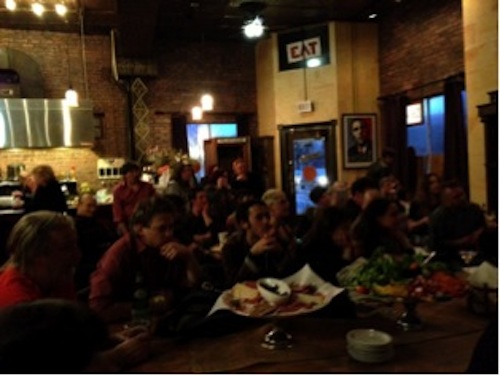
On Saturday evening the Horseless editors headlined a reading with Chris Fritton and others at Sweetness 7, a coffee shop on the West Side of town. Tynes and Sikkema, along with Shanna Compton (Bloof Books), made a point of reading from their own work and that of others they had published. Robin Brox of Just Buffalo and mIEKAL aND read together from of fracture, their 2012 homophonic revision of Bruce Andrews's fracture. Packing the chairs was a who's-who of local poets. There was Noah Falck, the new education director at Just Buffalo Literary Center; Aaron Lowinger, who co-hosts Just Buffalo's Big Night Series with Barbara Cole; and Catherine Wagner taking a timeout from her busy reading tour.
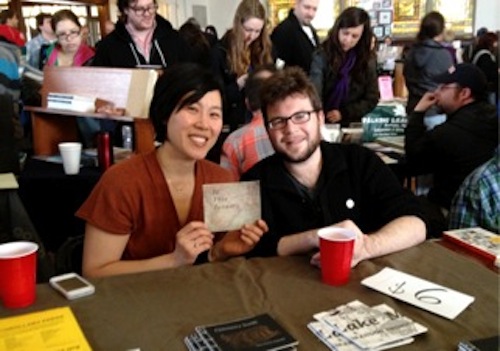
Sueyeun Juliette Lee and Ian Davisson were in town for a second year to showcase the latest publications from her Corollary Press—a chapbook series homage to Renee Gladman's Leroi/y series. Some of her latest are by Bhanu Kapil, Pamela Lu, Craig Santos Perez, Brandon Shimoda, and more. When I asked Lee what brought her back another year, she answered that "the energy and optimism about small press features is so heartwarming." She described her affection for the "made" book, and explained that all her chapbooks are hand-bound using a technique that she calls an "Asian stab-stitch." Many of the covers were also letter-pressed on an antique Adama platen press.
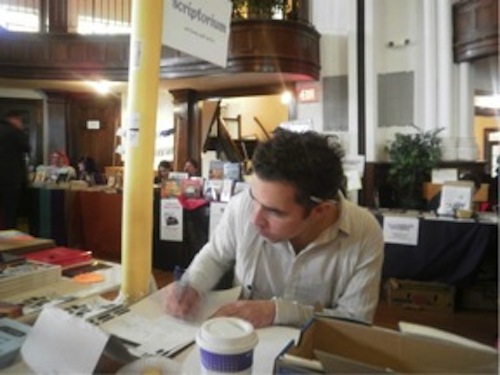
Arriving right on the heels of the fair, Conroy & Brown's Impractical Cartography collects testimonials by local twenty-somethings about coming of age in a period of economic privation, job shortages, and student debt. I grabbed a copy from the Sugar City arts collaborative, which had partially funded publication of the book through one of its Sunday Soup grants. Several contributors are regulars in my neighborhood--an English major who pays for his final semester by clerking at the co-op, a bookstore clerk who is soon to leave for Spain and who is meantime wonderfully tolerant of my daughter's inveterate mess in the kid section, or two artists who were on the team that produced Sol LeWitt's Scribble at the Albright-Knox Art Gallery. Buffalo is just big enough that it's possible to be surprised by new voices too, like many in this collection that I look forward to reading in the future.
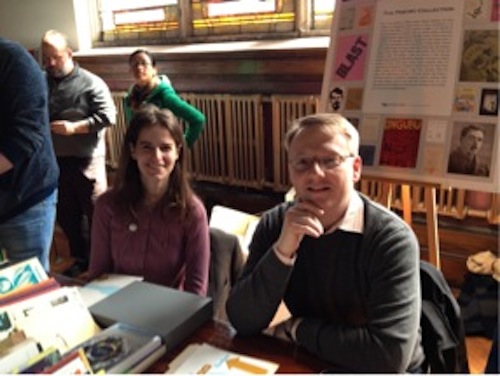
Next to the Poetry Collection table, Patrick Riedy set up a display of chapbooks from his Buffalo-based PressBoardPress. From him I nabbed the most treasured gem of the weekend, Michael Basinski's Learning POEM about Learning about being A POet. I'd heard Basinski read from it on a snowy spring day this year at the Anderson Gallery. Learning POEM is an autobiography of his boyhood, and the limited edition the chapbook is lovingly designed—120 copies with a letterpress cover, 110 in black, 10 in pink. Basinski is a local best kept secret, or would be if anyone kept the secret. I remember a marvelous remark from a San Francisco poet who'd read one of his books and wondered how it was possible such a brain could perform normal human activities like standing in line for groceries. The humility of this modest little chapbook left me laughing, weeping, and wishing for a sequel.
Normally at book or craft fairs I don't dream of hitting every table. I am wary of vendors who look lonely and neglected, and I prevaricate, gaze importantly at my phone, or become like Dickens's Artful Dodger. But there was so much to see this year, and the added incentive was that Harriet had charged me with stopping to ask questions. At one table, for example, was Brave Bird's Maude Alta, a knife-wielding local artist who creates black and white cut-outs that fall somewhere between Marianne Moore's bestiary and Kara Walker's fairy tale silhouettes. At another was Danielle Myers, owner of Petrichor Paper, who is implementing plans this year to create paper from invasive species like knotweed, kudzu, and garlic mustard. Then there was Earth’s Daughters, a group in its 42nd year and bearing the honor of "longest continually published feminist periodical in the U.S.." At another table for the Second Reader Bookshop I picked up election-style pins featuring the faces of Robert Creeley, Angela Davis, Hannah Arendt, and Jacques Lacan.
I'll stop here—too much to see and tell, too much to skim over in this short space. The fair will be back in 2014, and I'll be back for another round.
Kaplan Harris is editor, with Rod Smith and Peter Baker, of The Selected Letters of Robert Creeley (...
Read Full Biography

